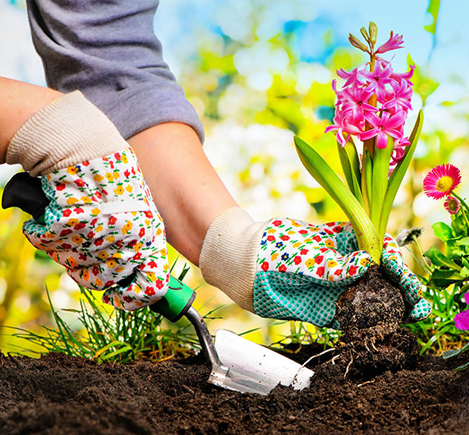The Power of Flowers!

As Mother’s Day officially heralds-in the notion of flowers, it also triggers us into motion in the yard! And rightly so, since in most locales, it’s the perfect time to plan and plant your garden. Growers have been taking great care for months to ensure that, come spring, they can flood the markets with every variety of annual, perennial, bush and tree you can think of. So, if growing a garden is your forte—it’s time to get in gear.

Raymond Liotta, LLA, PP, AICP, Director of Landscape Architecture
But before going flower-crazy, a little bit of planning goes a long way in helping you make the best choices. Here is some general advice from our Director of Landscape Architecture, Raymond Liotta, LLA, PP, AICP, to point your green thumb in the right direction!
Determine what type of garden you want
- Vegetable, flowers, at-grade, or raised bed.
- If you don’t have a yard, get creative! Plant flowers, veggies or herbs in containers or hanging baskets.
Don’t bite off more than you can chew
- Make sure you have enough time to tend to the garden size.
- Recruit help if necessary for the heavy-work.
Make sure you have the right tools
- Tillers, rakes, shovels, hoes, trowels, wheelbarrow, hand trimmers.
- Water hose and water source should be close to the garden.
Familiarize yourself with how the sun’s movement affects the light in your yard
- Vegetables need approximately 6-8 hours of sun per day. The location for vegetables should have a southern and southwest exposure.
- Choose appropriate plants for areas having less sun.
Plan a layout that provides plants enough room for growth
- Research how wide each plant will grow to prevent overcrowding as it grows.
- Plant far enough away from fences, foundations or walls for maintenance access.
Test the soil!
- Soil that provides nutrients and air space for root growth makes the healthiest plants. Testing the soil is the best way to see what your soil might need.
- Sending a soil sample to the local agricultural extension service is easy and can be done for a nominal fee.
- Follow the test result recommendations to amend (enhance) the soil to maximize plant growth. The recommendations will be based on the type of garden you are planning.
Here are a few regional soil testing labs. There are tons of them on the internet!
- Rutgers Soil Testing Lab
- University of Maryland Extension
- Virginia Tech Soil Testing Lab
- Mecklenburg County (Charlotte), NC
- University of Florida
Pick your plants wisely
- When picking out plants, consider the timing of each plant’s maturity (when it will bloom), the height (plant taller varieties in the back row or middle of a round garden) and how wide they will grow (for spacing). This will establish when to start planting and various types of plants to use.
- Research plant types for watering, fertilizer, pest management and watering needs. Follow the recommendations for best results.
Being a part of growing plants and flowers is a proven mood booster. Whether you’re planting flowers, veggies, or even installing sod, a little research and effort can bring great satisfaction in creating your outdoor space!
Have fun gardening!

Spring-time planting is fun!

Comments are closed.